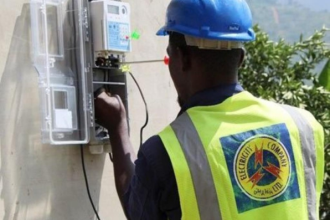Two civil society organisations have taken their crusade against the Electoral Commission’s decision to compile a new register to the Asantehene.
Policy think tanks IMANI Africa and the Alliance for Social Equity and Public Accountability (ASEPA) petitioned the Asantehene to intervene to stop the Electoral Commission from compiling a new voter’s register, scheduled to start in the latter part of this month, June.
They believe the Manhyia Palace, a venerable referee in Ghana’s polarised political environment, could talk the EC out of the decision they described as a waste of public resources.
In February this year, the country’s largest opposition, the National Democratic Congress (NDC), which opposes the register, also took their case to the respected traditional ruler.
While the NDC awaits the outcome of its petition, the two CSOs are also seeking the voice of Asanteman on the issue.
The Manhyia Palace has given indications that it would listen to the EC’s side of the story before making a pronouncement on the most topical issue that has a consequence for the 2020 elections.
Joy News reports suggest that the meeting was held behind closed doors in the absence of the Asantehene, Otumfuor Osei Tutu II.
IMANI’s case
After stepping out of the closed door meeting in the Ashanti Regional capital, the President of IMANI, Mr Franklin Cudjoe belittled the reasons the EC espoused to register Ghanaians nationwide for a new register.
“We are not against the registration of people to vote. We have said time without number that the cost claims the EC makes does not justify the procurement of a new register. The existing biometric machines are in good fit for running the elections,” he said.
The EC maintains that a new register is needed as the current biometric machines are outdated and fixing them would cost the public purse far higher than a new register would.
But Mr Cudjoe disagreed.
“The biometric verification machines have continuously been improved. Since 2016, they have spent close to more than $60 million in updating the verification machines. The EC’s own document, the Ministry of Finance documents and Parliamentary documents bear us out.
“In fact, the Auditor-General shows that consistently, the EC has spent money up until 2018 to update the register and has got lots of these machines for its worth.
Facial recognition
He also took for a pinch of salt, the EC’s argument that it intended to add facial recognition to the new system to verify voters. He insisted that the existing system was superior to what the commission was spending the taxpayers’ money on.
“How all of a sudden these machines are decrepit and kaput is just too difficult to bear. To think that they want to spend close to $200 million in procuring new systems simply because they claim that they to introduce another layer of verification, facial recognition is in itself the least of what the existing system can do.
“The existing system is far more superior in terms of identifying people than just facial recognition. I don’t know if it’s because people are going to wear masks so they want to find out people’s faces,” he said.
The procurement process for the existing biometric system was among the many reasons Charlotte Osei, the former EC Chairperson was tossed out of office –as the then Chief Justice Sophia Akuffo found a prima facie case against her.
The list of accusations included procurement irregularities. For Mr Cudjoe, that incident should provide an incentive for the current EC administration to take a cue.
“The procurement processes that led to the purchase of these new equipment is fraught with a lot of irregularities. Now people who believe that the cost issues have been over expressed and so we need a new register have also not given us any new good grounds. The EC has never for once suggested that the register is bloated.
But the Richard Ahiagbah, f the Danquah Institute, a pro-NPP think tank thinks otherwise.
Danquah Institute
He told Joy News that the current register was bloated as the Charlotte Osei-led EC failed to remove millions of names of voters, who registered with the National Health Insurance Scheme identification cards outlawed by the Supreme Court as proof of citizenship in Ghana.
He said the EC in 2016 deceived the apex court into believing that it had mechanisms to delete millions of names when in fact less than 70,000 names were removed.
“Apart from the number of people who had the national identification card, which is just a few, there is no documentation on paper on people who used NHIA cards to register, there is no record of those who used passport to register.
“How did they delete the supposed people who use the NHIA,” he queried.
















